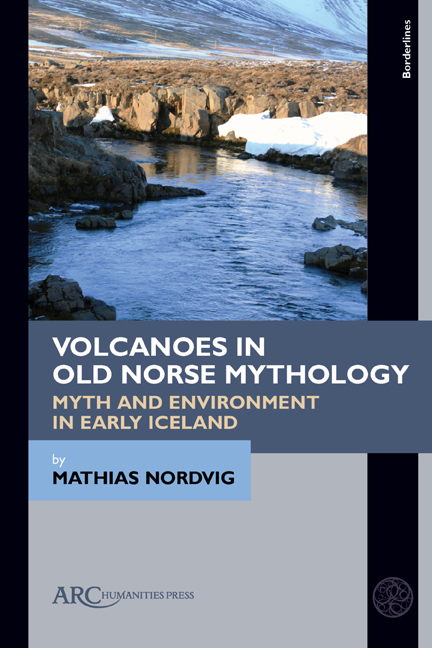Book contents
- Frontmatter
- Contents
- Introduction
- Chapter 1 Old Norse Mythology Between Environment and Literature
- Chapter 2 An Indigenous Theory of Volcanism in Iceland
- Chapter 3 Volcanism in Old Norse Cosmogony
- Chapter 4 Volcanoes in the Social Order of Old Norse Mythology
- Chapter 5 Volcanoes as a Cosmological Principle in Old Norse Mythology
- Bibliography
- Index
Chapter 2 - An Indigenous Theory of Volcanism in Iceland
Published online by Cambridge University Press: 13 April 2021
- Frontmatter
- Contents
- Introduction
- Chapter 1 Old Norse Mythology Between Environment and Literature
- Chapter 2 An Indigenous Theory of Volcanism in Iceland
- Chapter 3 Volcanism in Old Norse Cosmogony
- Chapter 4 Volcanoes in the Social Order of Old Norse Mythology
- Chapter 5 Volcanoes as a Cosmological Principle in Old Norse Mythology
- Bibliography
- Index
Summary
AN INDIGENOUS THEORY of volcanism can be identified in communities in proximity to volcanoes. It is indigenous because it has developed from the cultural needs of a local community and is expressed in local vocabularies, yet it is phenomenologically predicated on the same terms across the world. It makes use of the same common human repertoire for understanding volcanism. This repertoire is based on emotional responses to hazards, which often result in social structures that mitigate trauma. The common human repertoire is based on analogical references, where observed geologic phenomena are translated to mythological concepts. The components of a community's mythology are plotted onto the geological event and create a conceptual schema to understand and talk about the human-environmental relationship. Existing social codes compound with new ones that are generated from the experience. Often the language that is applied in this situation is convoluted and ambiguous because there is a lack of vocabulary to fully express the geologic processes and experiences.
It is a prevalent myth in scholarship on medieval Icelandic literature that volcanoes are not discussed. This is because there are few direct and coherent descriptions that are intelligible to contemporary readers. However, the Icelandic annals and auxiliary sources do talk about them in terms that are familiar to the modern observer. These accounts are the result of the hegemony established by the Latinate script-world. Scholars who have been trained in the Latinate script-world's immediate descendant, modern science, can have difficulties discerning other types of descriptions. In a comparative perspective, however, it becomes clear that Iceland had its own indigenous discourse on volcanism, which was defined by the worldview that the Scandinavian migrants brought with them. This discourse can be deduced from a set of myths in Old Norse mythology, which make use of structures, poetic references, and concepts that were applied to volcanism in the early stages of social development in Iceland. The Old Norse poem Hallmundarkviða is an excellent example of this. It reveals an indigenous Icelandic theory of volcanism that functions on similar terms as mythologies from Hawai’i, New Zealand, North America, Indonesia, certain places in Asia, and on the European and African continents.
- Type
- Chapter
- Information
- Volcanoes in Old Norse MythologyMyth and Environment in Early Iceland, pp. 33 - 54Publisher: Amsterdam University PressPrint publication year: 2021



